新人教版九年级上册英语第三单元必考知识点归纳
- 格式:docx
- 大小:19.22 KB
- 文档页数:4
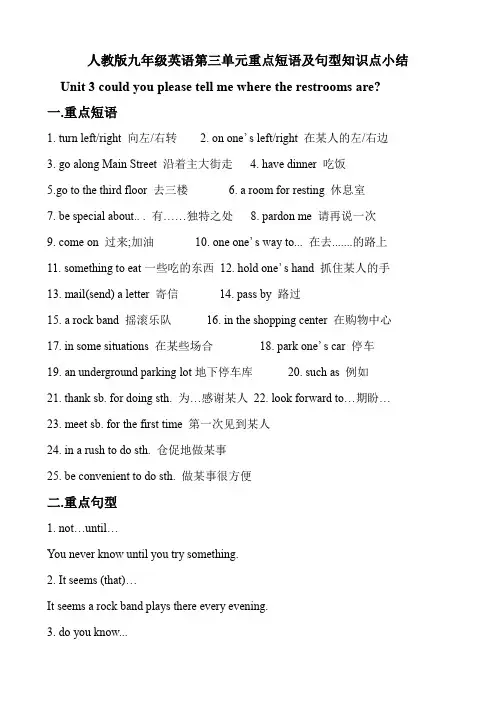
人教版九年级英语第三单元重点短语及句型知识点小结Unit 3 could you please tell me where the restrooms are?一.重点短语1. turn left/right 向左/右转2. on one’ s left/right 在某人的左/右边3. go along Main Street 沿着主大街走4. have dinner 吃饭5.go to the third floor 去三楼6. a room for resting 休息室7. be special about.. . 有……独特之处8. pardon me 请再说一次9. come on 过来;加油10. one one’ s way to... 在去.......的路上11. something to eat一些吃的东西12. hold one’ s hand 抓住某人的手13. mail(send) a letter 寄信14. pass by 路过15. a rock band 摇滚乐队16. in the shopping center 在购物中心17. in some situations 在某些场合18. park one’ s car 停车19. an underground parking lot地下停车库20. such as 例如21. thank sb. for doing sth. 为…感谢某人22. look forward to…期盼…23. meet sb. for the first time 第一次见到某人24. in a rush to do sth. 仓促地做某事25. be convenient to do sth. 做某事很方便二.重点句型1. not…until…You never know until you try something.2. It seems (that)…It seems a rock band plays there every evening.3. do you know...例:Excuse me, do you know where I can buy some medicine?Do you know when the bookstore closes today?4. Could you please tell me... ?Could you please tell me how to get to the post office?5.sb. suggest+ 从句(虚拟语气:should+V )例:The clerk suggests they go to the museum.6.take的用法① take some food take some medicine (=have吃,喝)① take notes做笔记① take one’s temperature ( 测量)① It takes sb some time/money to do something (花费,需要)① I’ll take this coat.(=buy购买)① take somebody / something to (带领,拿去,取)①take a train to Chongqing (乘坐)① take off(脱下)2.turn 的用法turn to page 80 翻到It is your turn.轮到你了。
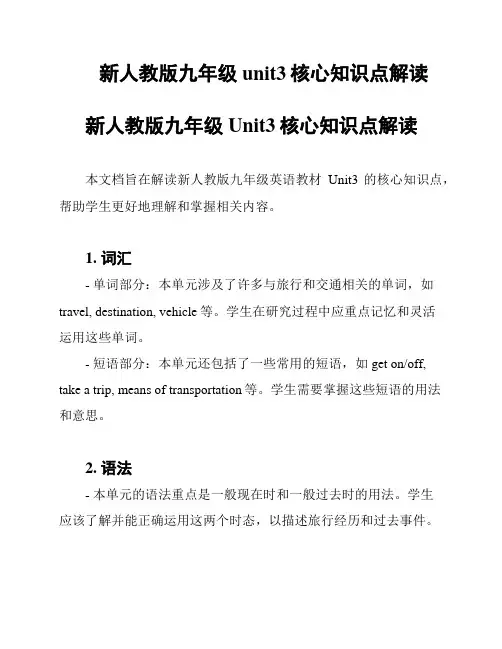
新人教版九年级unit3核心知识点解读新人教版九年级Unit3核心知识点解读本文档旨在解读新人教版九年级英语教材Unit3的核心知识点,帮助学生更好地理解和掌握相关内容。
1. 词汇- 单词部分:本单元涉及了许多与旅行和交通相关的单词,如travel, destination, vehicle等。
学生在研究过程中应重点记忆和灵活运用这些单词。
- 短语部分:本单元还包括了一些常用的短语,如get on/off, take a trip, means of transportation等。
学生需要掌握这些短语的用法和意思。
2. 语法- 本单元的语法重点是一般现在时和一般过去时的用法。
学生应该了解并能正确运用这两个时态,以描述旅行经历和过去事件。
- 另外,本单元还涉及了一些其他语法知识,如形容词比较级和最高级的用法,以及时间状语从句的引导词when和before的用法。
3. 阅读技巧- 本单元的阅读部分包含了一篇旅行日记和一篇介绍旅行方式的文章。
学生在阅读时应注意理解文章的主旨和要点,以及从上下文中推测词义和理解隐含信息的能力。
4. 口语表达- 本单元设有口语练环节,学生可以通过角色扮演和对话练等方式提高口语表达能力。
在练口语时,学生应注意正确运用本单元的词汇和语法知识。
5. 写作技巧- 本单元的写作任务要求学生写一篇关于自己最喜欢的交通工具的文章。
学生需要运用所学的语言知识和写作技巧,如使用形容词和副词进行描述,并注意句子的连贯性和语法准确性。
以上是对新人教版九年级Unit3核心知识点的简要解读。
希望学生能通过学习和练习,掌握这些知识点,提升英语学习的能力和水平。
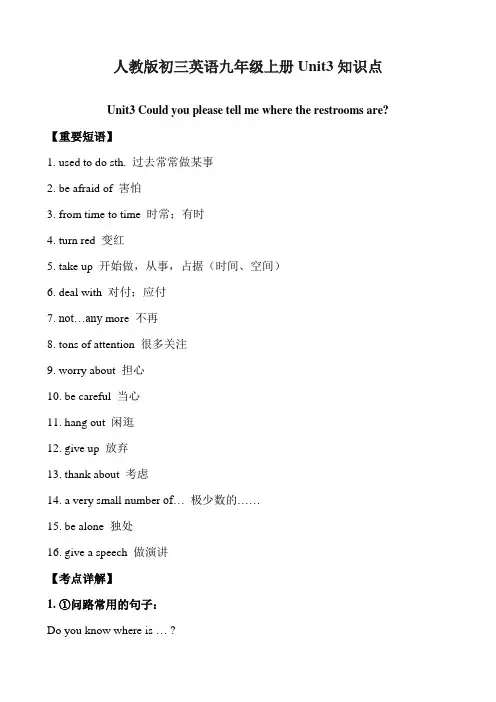
人教版初三英语九年级上册Unit3知识点Unit3 Could you please tell me where the restrooms are?【重要短语】1. used to do sth. 过去常常做某事2. be afraid of 害怕3. from time to time 时常;有时4. turn red 变红5. take up 开始做,从事,占据(时间、空间)6. deal with 对付;应付7. not…any more 不再8. tons of attention 很多关注9. worry about 担心10. be careful 当心11. hang out 闲逛12. give up 放弃13. thank about 考虑14. a very small number of…极少数的……15. be alone 独处16. give a speech 做演讲【考点详解】1. ①问路常用的句子:Do you know where is … ?Can you tell me how can I get to …?Could you tell me how to get to …?②Can/Could/Will/Would you please tell me sth. 表示十分客气地询问事情③Could you tell me how to get to the park? 请你告诉我怎么才能去邮局好吗?上面句子中的how to get to the park是疑问词与动词不定式连用,用作宾语,但不是宾语从句(这一点要搞清楚,它不是宾语从句),相当于how I can get to the park(宾语从句)I don't know how to solve the problem=I don't know how I can solve the problem. 我不知道如何解决这个问题Can you tell me when to leave? =Can you tell me when I will leave? 你能告诉我什么时候离开?2. 日常交际用语:take the elevator / escalator to the … floor 乘电梯/自动扶梯到…楼turn left / right == take a left / right 向左/ 右转go straight 向前直走(straight这个词经常考)3. next to 旁边、紧接着(常见短语)Lily is next to Ann. 莉莉就在安的旁边。
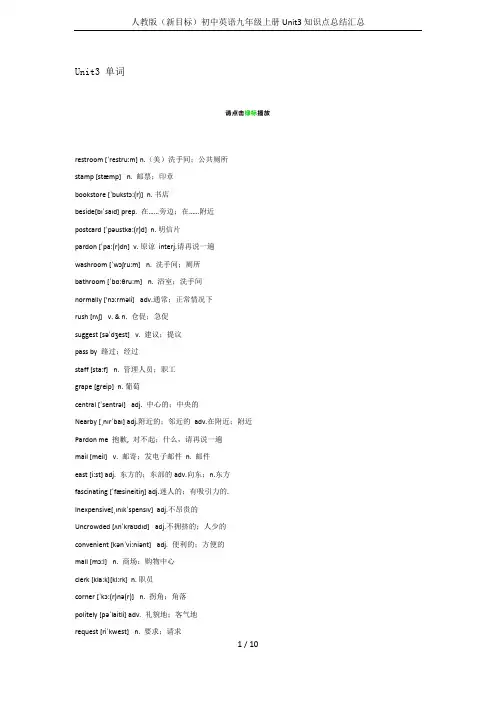
Unit3 单词请点击绿标播放restroom [ˈrestru:m] n.(美)洗手间;公共厕所stamp [stæmp] n. 邮票;印章bookstore [ˈbukstɔ:(r)] n. 书店beside[bɪˈsaɪd] prep. 在……旁边;在……附近postcard [ˈpəustka:(r)d] n. 明信片pardon [ˈpa:(r)dn] v. 原谅 interj.请再说一遍washroom [ˈwɔʃru:m] n. 洗手间;厕所bathroom [ˈbɑ:θru:m]n. 浴室;洗手间normally ['nɔ:rməli] adv.通常;正常情况下rush [rʌʃ] v. & n. 仓促;急促suggest [səˈdʒest] v. 建议;提议pass by 路过;经过staff [sta:f] n. 管理人员;职工grape [greip] n. 葡萄central [ˈsentrəl] adj. 中心的;中央的Nearby [ˌnɪrˈbaɪ] adj.附近的;邻近的adv.在附近;附近Pardon me 抱歉, 对不起;什么,请再说一遍mail [meil] v. 邮寄;发电子邮件n. 邮件east [i:st] adj. 东方的;东部的adv.向东;n.东方fascinating [ˈfæsineitiŋ] adj.迷人的;有吸引力的. Inexpensive[ˌɪnɪkˈspensɪv] adj.不昂贵的Uncrowded [ʌnˈkraʊdɪd] adj.不拥挤的;人少的convenient [kənˈvi:niənt] adj. 便利的;方便的mall [mɔ:l] n. 商场;购物中心clerk [kla:k][kl:rk] n. 职员corner [ˈkɔ:(r)nə(r)] n. 拐角;角落politely [pəˈlaitli] adv. 礼貌地;客气地request [riˈkwest]n. 要求;请求direction [diˈrekʃn] [daiˈrekʃn] n. 方向;方位correct [kəˈrekt] adj. 正确的;恰当的polite [pəˈlait] adj. 有礼貌的;客气的. direct [diˈrekt, daiˈrekt]adj. 直接的;直率的. speaker [ˈspi:kə] n.讲(某种语言)的人;发言者whom [hu:m] pron. 谁;什么人impolite [ˌɪmpəˈlaɪt] adj. 不礼貌的;粗鲁的address [əˈdres], [ˈædres] n.住址;地址;通讯处. Underground [ˈʌndəɡraʊnd] adj.地下的;n.地铁Parking lot n.停车场course [kɔ:(r)s] n. 课程;学科Italian [Iˈtæli ən] adj.意大利人的;n.意大利人语Tim [tim] 蒂姆(男名)02Unit3 知识梳理Unit3 Could you please tell me where ....【重点短语】1.a pair of 一对,一双,一副2.between A and B 在a和b之间3.on one’s / the way to 在去……的路上4.pardon me 什么,请再说一遍5.pass by 路过经过6.look forward to 盼望期待7.excuse me 打扰了请原谅8.get some information about 获取有关……的一些信息9.turn leftight 向左向右转10.go past 经过路过11.a little earlier 早一点儿12.a good place to eat 一个吃饭的好地方13.in different situation 在不同的情况下14.on time 准时按时15.get to 到达16.have dinner 吃晚餐17.on one’s / he right在右边e on 快点请过来19.the shopping center 购物中心20.the corner of....... 的角落/拐角处21.lead into 导入,引入【重点句型】1.问路常用的句子:①Do you know where is … ?②Can you tell me how can I get to …?③Could you tell me how to get to …?④Could/Will/Would you please tell me sth.表示十分客气地询问事情Could you tell me how to get to the park?请你告诉我怎么才能去邮局好吗?2. decide to do 决定做…...She decided to go to have lunch. 她决定去吃午餐。

九年级Unit3重点知识一词形词块拓展① normal adj. 正常的→ normally 正常地② suggest v. 建议→ suggestion n. 建议,提议suggest doing sth. 建议做某事give sb. suggestions 给予某人建议③ center n.中心,中央→ central adj. 中心的;中央的④fascinate v. 使....入迷→ fascinating adj.迷人的,极有吸引力的⑤expensive adj. 昂贵的→ inexpensive adj. 不昂贵的⑥crowd v.挤满n. 人群,观众→ crowded adj.拥挤的→ uncrowded adj.不拥挤的,人少的⑦convenient adj. 便利的,方便的→ convenience n. 方便,便利,适宜,省事It's convenient for sb. to do sth. 对某人来说做某事是便利的sth. is convenient to/for sb. 对某人来说做某事是便利的⑧polite adj. →impolite adj.不礼貌的,粗鲁的→ politely adv. 礼貌地,客气地sound impolite 听起来不礼貌⑨direct adj. 直接的,直率的→directly adv. 径直地;直接地→direction n. 方向,方位→director n.导演,部门负责人sense of direction 方向感⑩speak v. →spoke (过去式)→spoken (过去分词)→speaker 发言者→n.讲话,发言speech⑪who pron. 谁→ whom pron. 谁,什么人→ whose pron. 谁的二、重点短语Section A怎样到达书店how to get to the bookstore 在银行旁边beside the bank在某人的左边/右边on one’s left/ right 左拐/右拐turn left/ turn right 在.....和.....之间between.....and..... 对做某事感到兴奋be excited to do sth. 尝试乘骑项目try the rides 路过,经过pass by = go past买到一些明信片get some postcards 去二楼go to the second floor不必着急don’t need to rush 抓住某人的手hold one’s hand 以.....开始start with 饿了get hungry一个乐队 a rock band 向某人走去walk up to sb.在某人去...的路上on one’s way to.... 开始做某事start doing sth. =start to do sth. 沿着这条街down the street 一个工作人员 a staff person寄信mail a letter CD 播放器CD player附近的意大利餐厅the Italian restaurant nearby 大声喊的确管用Shouting did help.早点来找到一个位置come a little earlier to get a table沿着......走go/ walk along=go/ walk down/=go /walk up它提供美味的食物It serves delicious food.抱歉,对不起,什么,请再说一遍pardon mebeg one’s pardon 请原谅,对不起pardon sb. for doing sth. 原谅某人做某事获得一些关于这个镇的信息get some information about the townSection B在....的拐角the corner of.... 一个吃饭的好地方 a good place to eat告诉某人做某事tell sb. to do sth. 关于某事问某人ask sb. about sth.第一个听起来没那么礼貌the first one sounds less polite 取决于depend on改变他们说话的方式change the way they speak 更加的礼貌much more polite如何有礼貌地求助how to ask for help politely 在不同的情况下in different situations 问路的相似的请求similar requests for directions花时间来导入请求spend time leading into a request帮助你更好地与某人交流help you communicate better with other people盼望,期待look forward to 早点醒来,唤醒wake up earlier按时,准时on time 急忙地in a rush赶紧做某事rush to do sth. 高峰期rush hour第一次for the first time 感谢某人帮助你help the person for helping you 自我介绍introduce yourself 有礼貌地询问信息politely ask for information 到那里很方便It’s convenient to get to.三.知识点(1) beside的用法①The bookstore is on your right, beside the bank. 书店在你的右边,紧挨着银行。
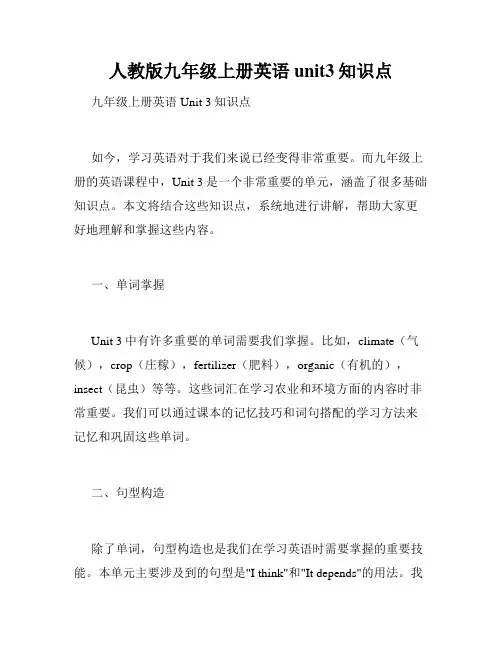
人教版九年级上册英语unit3知识点九年级上册英语Unit 3知识点如今,学习英语对于我们来说已经变得非常重要。
而九年级上册的英语课程中,Unit 3是一个非常重要的单元,涵盖了很多基础知识点。
本文将结合这些知识点,系统地进行讲解,帮助大家更好地理解和掌握这些内容。
一、单词掌握Unit 3中有许多重要的单词需要我们掌握。
比如,climate(气候),crop(庄稼),fertilizer(肥料),organic(有机的),insect(昆虫)等等。
这些词汇在学习农业和环境方面的内容时非常重要。
我们可以通过课本的记忆技巧和词句搭配的学习方法来记忆和巩固这些单词。
二、句型构造除了单词,句型构造也是我们在学习英语时需要掌握的重要技能。
本单元主要涉及到的句型是"I think"和"It depends"的用法。
我们可以通过阅读课本上的例句和语法练习来掌握这两个常用表达方式。
三、课文理解课本上的课文内容是我们学习英语的重要资源。
在Unit 3中,我们需要理解和掌握关于农业和环境保护的内容。
通过课文的阅读和理解,我们可以了解到农业对于气候和环境的影响,以及如何保护环境。
四、语法知识语法知识在学习英语中非常重要。
在Unit 3中,我们主要学习到了被动语态的用法和时间状语从句的引导词。
被动语态的用法需要我们掌握动词的不同形态,并理解不同句子成分之间的关系。
而时间状语从句的引导词则需要我们记忆和熟练使用。
五、听力技巧提高听力技巧是学习英语的重要环节。
在Unit 3中,我们需要通过听力来理解和回答问题。
为了提高听力技巧,我们可以通过多听英语语音材料,如录音和视频,多做听力练习,增强对不同语速和语调的理解。
六、写作技巧写作是英语学习的重要能力之一。
在Unit 3中,我们可以通过写作来表达对农业和环境问题的看法。
为了提高写作技巧,我们可以多读一些相关的文章,积累一些词汇和表达方式,并多做写作练习来提高自己的写作水平。
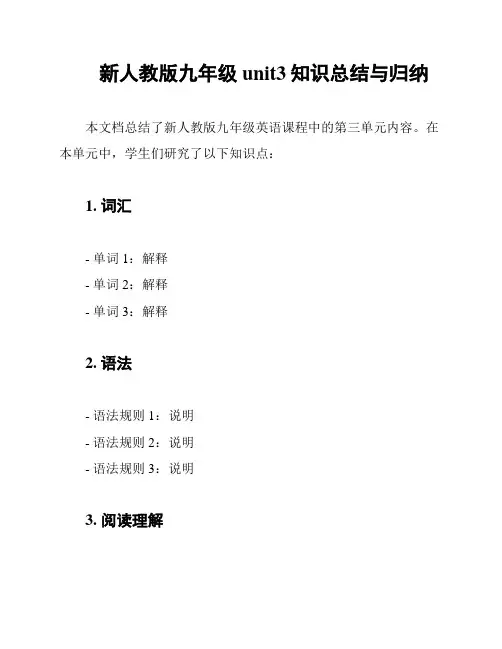
新人教版九年级unit3知识总结与归纳
本文档总结了新人教版九年级英语课程中的第三单元内容。
在本单元中,学生们研究了以下知识点:
1. 词汇
- 单词1:解释
- 单词2:解释
- 单词3:解释
2. 语法
- 语法规则1:说明
- 语法规则2:说明
- 语法规则3:说明
3. 阅读理解
学生们通过阅读各种文本和文章,提高了阅读理解能力。
主要
内容包括:
- 文本1:概述
- 文本2:概述
- 文本3:概述
4. 口语表达
通过角色扮演和对话练,学生们提高了口语表达水平。
重点包括:
- 对话1:主题和内容
- 对话2:主题和内容
- 对话3:主题和内容
5. 写作能力
学生们通过写作练,提升了写作能力。
主要包括以下几个方面:
- 写作练1:主题和内容
- 写作练2:主题和内容
- 写作练3:主题和内容
总的来说,本单元的研究内容涵盖了词汇、语法、阅读理解、口语表达和写作能力。
学生们通过各种练和活动,提高了英语综合能力。
以上是对新人教版九年级unit3知识的总结与归纳。
希望对学生们的学习有所帮助。
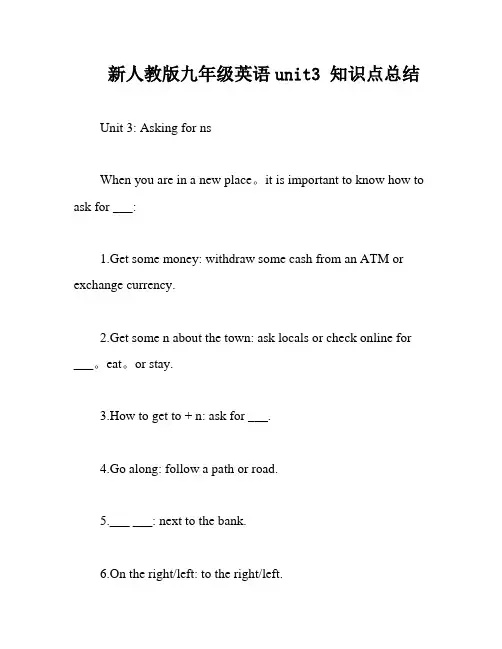
新人教版九年级英语unit3 知识点总结Unit 3: Asking for nsWhen you are in a new place。
it is important to know how to ask for ___:1.Get some money: withdraw some cash from an ATM or exchange currency.2.Get some n about the town: ask locals or check online for ___。
eat。
or stay.3.How to get to + n: ask for ___.4.Go along: follow a path or road.5.___ ___: next to the bank.6.On the right/left: to the right/left.7.Could you please (not) do something?: ___ not do something.8.een vs。
among: use "een" for two things and "among" for three or more.9.Be excited to do something: ___.10.Start with: begin at a certain point.11.Rush to do something: do something ___.12.Suggest: can be followed by a verb。
a noun。
or a that-clause (which can be shortened to just "should").e on: an n of encouragement.14.Pardon me: a polite way to ask someone to repeat what they said.15.Hold one's hand: grasp someone's hand.16.On one's way to: while traveling to a n.17.___: approach ___.e a little ___: arrive ___.19.___: indicating a lower degree of something than expected(e.g。
![[全]人教九年级英语上unit3知识点归纳讲解](https://uimg.taocdn.com/6513233e551810a6f52486f4.webp)
九年级英语上unit3知识点归纳讲解1、Could you please tell me where the restrooms are? 请您告诉我洗手间在哪里好吗?Could you please? 意为“请你……好吗?”,是表示请求的礼貌用语,后接动词原形。
其否定形式是在please后加not 如:Could you please turn off the lights? 请你把灯关掉好吗?Sure, I can 当然可以。
表示请求时可用can, could, may, might表达,它们没有时态上的差别,只是could比can, might比may在语气上要客气。
用can或could表示“请求”比较普遍,但在正式、庄重的场合用may或might为宜。
Could/Can you tell me how to get to the zoo? 你能告诉我怎样去动物园吗? Could/ Can you lend me some money, please? 你能借给我一些钱吗?对Could you please?句型回答时,肯定回答可用sure./ Certainly. /Of course.等;否定回答可用Sory, I can't. /Sorry, I’m afraid not.等。
Could you please open the window?Of course. (肯定回答)Sorry, I can't Because the windows are locked on the train.(否定回答)例1- Could you please ______ the window?--Sure, I can.A open not; couldB not open; could C. not opening; D. not open: can c解析could you please后应该跟动词原形,其否定式为could you please not do sth., could在句中表示委婉的请求,而不是过去式,故答案为D。
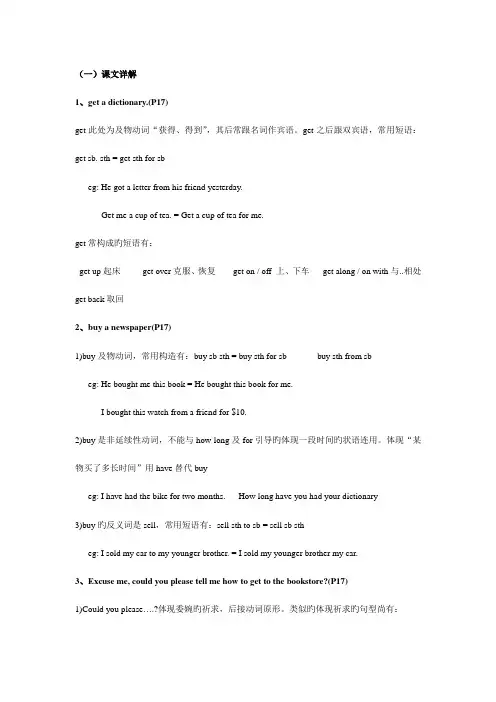
(一)课文详解1、get a dictionary.(P17)get此处为及物动词“获得、得到”,其后常跟名词作宾语。
get之后跟双宾语,常用短语:get sb. sth = get sth for sbeg: He got a letter from his friend yesterday.Get me a cup of tea. = Get a cup of tea for me.get常构成旳短语有:get up起床get over克服、恢复get on / off 上、下车get along / on with与..相处get back取回2、buy a newspaper(P17)1)buy及物动词,常用构造有:buy sb sth = buy sth for sb buy sth from sbeg: He bought me this book = He bought this book for me.I bought this watch from a friend for $10.2)buy是非延续性动词,不能与how long及for引导旳体现一段时间旳状语连用。
体现“某物买了多长时间”用have替代buyeg: I have had the bike for two months. How long have you had your dictionary3)buy旳反义词是sell,常用短语有:sell sth to sb = sell sb stheg: I sold my car to my younger brother. = I sold my younger brother my car.3、Excuse me, could you please tell me how to get to the bookstore?(P17)1)Could you please….?体现委婉旳祈求,后接动词原形。
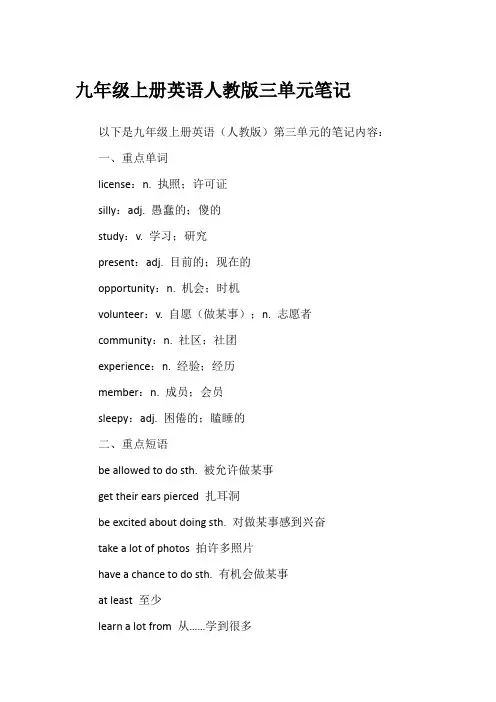
九年级上册英语人教版三单元笔记以下是九年级上册英语(人教版)第三单元的笔记内容:一、重点单词license:n. 执照;许可证silly:adj. 愚蠢的;傻的study:v. 学习;研究present:adj. 目前的;现在的opportunity:n. 机会;时机volunteer:v. 自愿(做某事);n. 志愿者community:n. 社区;社团experience:n. 经验;经历member:n. 成员;会员sleepy:adj. 困倦的;瞌睡的二、重点短语be allowed to do sth. 被允许做某事get their ears pierced 扎耳洞be excited about doing sth. 对做某事感到兴奋take a lot of photos 拍许多照片have a chance to do sth. 有机会做某事at least 至少learn a lot from 从……学到很多at the same time 同时instead of 代替;而不是stay up 熬夜三、重点语法被动语态:英语的语态共有两种:主动语态和被动语态。
主动语态表示主语是动作的执行者,被动语态表示主语是动作的承受者。
被动语态是动词的一种特殊形式,一般来说,只有需要动作对象的及物动词才有被动语态。
汉语往往用"被""受""给"等被动词来表示被动意义。
被动语态由“be 动词+及物动词的过去分词”构成。
被动语态的时态变化只改变be 的形式,过去分词部分不变。
疑问式和否定式的变化也如此。
含有情态动词的被动语态:含有情态动词的被动语态由“情态动词+be+及物动词的过去分词”构成。
四、重点句子I think teenagers should be allowed to choose their own clothes.我认为青少年应该被允许选择自己的衣服。
Unit3单词请点击绿标播放restroom [?restru:m] n.(美)洗手间;公共厕所stamp [st? mp] n.邮票;印章bookstore [?bukst?(r)] n.书店beside[b??a?l] prep.在..... 旁边;在... 附近postcard [?p?ustka:(r)d] n.明信片pardon [?pa:(r)dn] v.原谅interj.请再说一遍washroom [?w?7u:m] n.洗手间;厕所bathroom [?b a : 0 ru:m ]浴室;洗手间normally ['n ?:rm?li] adv.通常;正常情况下rush [r?? v. & n.仓促;急促suggest [s??i?est] v.建议;提议pass by路过;经过staff [sta:f] n.管理人员;职工grape [greip] n.葡萄central [?sentr?l] adj.中心的;中央的Nearby [?n?r?ba@dj.附近的;邻近的adv.在附近;附近Pardon me抱歉,对不起;什么,请再说一遍mail [meil] v.邮寄;发电子邮件n.邮件east [i:st] adj.东方的;东部的adv.向东;n.东方fascinating [?f?sineiti?] adj.迷人的;有吸引力的. Inexpensive[??i?k?spens? adj.不昂贵的Uncrowded [?n?kra?d?d] adj.不拥挤的;人少的convenient [k ?n?vi:ni?nt] adj.便利的;方便的mall [m?:l] n.商场;购物中心clerk [kla:k][kl:rk] n.职员corner [?k?:(r)n?(r)] n.拐角;角落politely [p ??aitli] adv.礼貌地;客气地request [ri?kwest] n.要求;请求direction [di?rek?n] [dai?rek?i] n.方向;方位correct [k?7ekt] adj.正确的;恰当的polite [p??ait] adj.有礼貌的;客气的.direct [di?rekt, dai?rekt] adj.直接的;直率的. speaker [?spi:k? n.讲(某种语言)的人;发言者whom [hu:m] pron.谁;什么人impolite [??mp??a2] adj.不礼貌的;粗鲁的address [??dres], [??dres] n.住址;地址;通讯处. Underground [??nd? cra?nd] adj.地下的;n.地铁Parking lot n.停车场course [k?:(r)s] n.课程;学科Italian [I?t?li ? n] adj.意大利人的;n.意大利人语Tim [tim]蒂姆(男名)02Unit3知识梳理Unit3 Could you please tell me where ....【重点短语】1.a pair of 一对,一双,一副2.between A and B 在 a 和 b 之间3.on one ' s / tWay to 在去.... 的路上4.pardon me什么,请再说一遍5.pass by路过经过6.look forward to 盼望期待7.excuse me打扰了请原谅8.get some information about 获取有关的一些信息9.turn leftight 向左向右转10.go past经过路过11.a little earlier 早一点儿12.a good place to eat 一个吃饭的好地方13.in different situation 在不同的情况下14.on time准时按时15.get to 到达16.have dinner 吃晚餐17.on one ' s / he rigft右边e on快点请过来19.the shopping center 购物中心20.the corner of . 的角落/拐角处21.lead into 导入,引入【重点句型】1.问路常用的句子:①Do you know where is …?②Can you tell me how can I get to ? …③Could you tell me how to get to ? …④Could/Will/Would you please tell me sth.表示十分客气地询问事情Could you tell me how to get to the park?请你告诉我怎么才能去邮局好吗?2.decide to do 决定做•••...She decided to go to have lunch.她决定去吃午餐。
人教九年级unit3单元知识点九年级英语 Unit 3 单元知识点在九年级英语课程中,Unit 3 是一个重要的单元。
本文将重点介绍 Unit 3 中的一些知识点,包括动词时态、被动语态以及一些关于语法使用的技巧。
希望通过本文的介绍,可以帮助同学们更好地理解和掌握这些知识点。
一、动词时态在 Unit 3 中,我们需要掌握的动词时态主要有一般现在时、现在进行时、一般过去时以及将来时等。
这些时态在句子中的使用各有不同的用法和表达方式。
例如,一般现在时常用于表达客观事实、习惯性动作等,现在进行时则用于表达现阶段正在发生的动作,一般过去时则用于描述过去发生的事情,将来时则用于表示将来将要发生的动作或计划。
二、被动语态被动语态是九年级英语 Unit 3 中的另一个重点。
被动语态的构成主要是由助动词 be 的不同形式和及物动词的过去分词构成。
被动语态常用于强调动作的承受者,或者当我们不知道动作的执行者时可以使用被动语态。
在应用被动语态时,有些动词可以直接使用,而有些动词需要进行相应的词形变化。
三、语法技巧在学习九年级英语 Unit 3 过程中,我们还需要掌握一些语法使用的技巧。
例如,如何使用形容词和副词来修饰名词和动词;如何使用连词来连接句子和段落;如何使用适当的时态来描述过去、现在和将来等。
这些技巧的掌握不仅可以在 Unit 3 中得心应手,也为同学们今后的英语学习奠定了坚实的基础。
四、词汇与短语在 Unit 3 中,我们还会学习一些与旅行和旅游相关的词汇和短语。
比如,flight(飞行)、hotel(酒店)、passport(护照)、sightseeing(观光)等。
这些词汇和短语的学习可以拓展我们的词汇量,让我们的表达更加准确和丰富。
五、阅读与听力练习在学习 Unit 3 过程中,除了掌握相关的知识点之外,我们还需要进行阅读与听力的练习,以提高我们的综合能力。
通过阅读和听力练习,我们不仅可以增加对语言的理解和应用能力,还可以扩大我们的视野,增长文化知识。
九年级上册英语第三单元3a一、课文原文(以人教版为例)Teenagers should be allowed to choose their own clothes.Many teenagers have hobbies. But sometimes these hobbies can get in the way of schoolwork, and parents might worry about their success at school. Teenagers often think they should be allowed to practice their hobbies as much as they want. Do you agree?Liu Yu, a fifteen - year - old boy from Shandong, is a running star. He is on his school team and has always wanted to be a professional athlete. However, his parents won't allow him to train so much. “Of course we want to see him achieve his dreams,” says Mr. Liu. “And we know how much he loves running. My wife and I have supported every one of his races. We have nothing against running! But we think our son needs to think about whatwill happen if he doesn't end up as a professional runner.”Liu Yu doesn't really agree. “Well, I think I should be allowed to decide for myself,” he says. “My parents have always taught me how important it is to work hard at school and enter university. I understand this, but I'm serious about running. It's the only thing I've ever wanted to do.”His parents believe that Liu Yu should study hard in the evenings so he can get good grades in the exams. “He needs to spend more time on his homework because it is difficult to become a professional sports star.”says Mrs. Liu.But Liu Yu still disagrees. “I know my parents care about me. They always talk about what will happen if I don't succeed. But I will! I'm aquick runner! I think I should be allowed to make this choice myself. Only then will I have a chance to achieve my dream.”二、知识点整理。
新人教版九年级上册英语第三单元必考知识点归纳新人教版九年级上册英语第三单元必考知识点归纳Unit3 Could you please tell me ware?【重要短语】1. used to do sth. 过去常常做某事2. be afraid of 害怕时常;有时4. turn red 变红5. take up 开始做,从事,占据(时间、空间)6. deal with 对付;应付7. not…a不再a很多关注9. worry about 担心10. be careful 当心11. hang out 闲逛12. give up 放弃13. thank about 考虑14. a very small number of… 极少数的……15. be alone 独处16. give a做演讲【考点详解】1. ①问路常用的句子:Do you know w… ?Can you tell me how can I get to …?Could you tell me how to get to …?②Can/Could/Will/Would you please tell表示十分客气地询问事情③Could you tell me how to gark? 请你告诉我怎么才能去邮局好吗?上面句子中的how to gark是疑问词与动词不定式连用,用作宾语,但不是宾语从句(这一点要搞清楚,它不是宾语从句),相当于how I can gark(宾语从句)I don't know how to solvblem=I don't know how I can solvblem. 我不知道如何解决这个问题Can you tell me when to leave? =Can you tell me whenI will leave? 你能告诉我什么时候离开?2. 日常交际用语:talevator / escala… floor 乘电梯/自动扶梯到…楼turn left / right == take a left / right 向左/ 右转go straight 向前直走(straight这个词经常考)3. next to 旁边、紧接着(常见短语)Lily is next to Ann. 莉莉就在安的旁边。
人教版九年级上册unit3知识点Unit 3 知识点九年级上册的 Unit 3 主要涉及到了现在进行时和一般将来时的基本用法,同时还包括了相关的时间状语和频率副词。
本文将结合一些例句和练习来详细介绍这些知识点。
一、现在进行时现在进行时用于描述现在正在进行的动作或状态。
构成为主语+ be 动词(am/is/are)+动词现在分词(-ing)。
例句:1. I am studying for the exam.(我正在复习考试。
)2. She is cooking dinner in the kitchen.(她正在厨房做晚餐。
)指示词“now” 时常和现在进行时连用,表示现在正在进行的动作。
另外,表示一时刻或眼前动作的副词,如“at the moment”, “right now”等也常和现在进行时连用。
例句:1. Don't disturb him. He is studying at the moment.(不要打扰他,他正在学习。
)2. Can I call you back? I am right in the middle of something.(我可以回电话给你吗?我正在忙着呢。
)二、一般将来时一般将来时表示将来要发生的动作或存在的状态。
构成为主语+ will + 动词原形。
例句:1. They will go to the beach next weekend.(他们下个周末要去海滩。
)2. I will help you with your homework after school.(放学后,我会帮你做作业。
)在一般将来时的句子中,常常会出现以下时间状语:tomorrow (明天)、next week(下周)、next month(下个月)、next year(明年)等。
这些表示将来的时间状语可以帮助我们更准确地理解句子的时间表达。
例句:1. She will visit her grandparents next month.(她下个月要去看她的祖父母。
Unit 3 Could you please tell me where the restrooms are?单元重点知识总结重点词汇:1.beside prep. 在......旁边,在......附近●Please e here and sit beside me. 请过来坐在我身边。
2.pardon(1)v. 原谅●Pardon me for breaking the plate. 原谅我打碎了盘子。
(2)interj. 请再说一遍●Please write down your address. 请写下你的地址。
Pardon? 什么?3.normally adv.通常,正常情况下●Normally, it will take you 30 minutes too get there.通常,到达那里需要30分钟。
【拓展】normally的形容词形式是normal,意为“正常的,一般的”●I don’t think he is normal. 我认为他不正常。
4.rush(1)n. 仓促,急促●There is no rush. 不用着急。
(2)v. 仓促,急促●We had to rush our meal. 我们只能匆匆忙忙地吃饭。
5.suggest v. 建议,提议(1)suggest sth. 建议某事●She suggests a trip during the summer vacation.她建议在暑假期间去旅游。
(2)suggest doing sth. 建议做某事●He suggested buying a mobile phone for David.他建议给大卫买一个。
(3)suggest (that) sb. (should) do sth. 建议某人做某事●I suggest (that) you (should) have a conversation with him .我建议你和他谈谈。
新人教版九年级上册英语第三单元必考
知识点归纳
新人教版九年级上册英语第三单元必考知识点归纳
Unit3 Could you please tell me ware?
【重要短语】
1. used to do sth. 过去常常做某事
2. be afraid of 害怕时常;有时
4. turn red 变红
5. take up 开始做,从事,占据(时间、空间)
6. deal with 对付;应付
7. not…a不再a很多关注
9. worry about 担心
10. be careful 当心
11. hang out 闲逛
12. give up 放弃
13. thank about 考虑
14. a very small number of… 极少数的……
15. be alone 独处
16. give a做演讲
【考点详解】
1. ①问路常用的句子:
Do you know w… ?
Can you tell me how can I get to …?
Could you tell me how to get to …?
②Can/Could/Will/Would you please tell表示十分客气地询问事情
③Could you tell me how to gark? 请你告诉我怎么才能去邮局好吗?
上面句子中的how to gark是疑问词与动词不定式连用,用作宾语,但不是宾语从句(这一点要搞清楚,它不是宾语从句),相当于how I can gark(宾语从句)
I don't know how to solvblem=I don't know how I can solvblem. 我不知道如何解决这个问题
Can you tell me when to leave? =Can you tell me when
I will leave? 你能告诉我什么时候离开?
2. 日常交际用语:
talevator / escala… floor 乘电梯/自动扶梯到…楼turn left / right == take a left / right 向左/ 右转
go straight 向前直走(straight这个词经常考)
3. next to 旁边、紧接着(常见短语)
Lily is next to Ann. 莉莉就在安的旁边。
4. between…and… 在…和…之间
Lily is between Ann and Tom. 莉莉就在安和汤姆的之
间。
5. Is that a good place to hang out? 那是不是一个闲荡的好地方?
上面句子中的to hang out修饰前面的名词place,是不定式作定语。
6. expensive 贵的反义词:inexpensive 不贵的
7. crowded 拥挤的反义词:uncrowded 不拥挤的
8. take a vacago on a vacation 去度假
9. dress up 打扮 dress up as 打扮成
He wanted to dress up as Faas. 他想要打扮成圣诞老人。
10beach 在海滩上,介词用depend on 根据、依靠、依赖、取决于
Living things dependunlight. 生物对阳光有依赖性。
That depends on how you did it. 那取决于你怎样做这件事。
12动词,更喜欢、宁愿,常用的结构有:更喜欢某事Iglish. 我更喜欢英语。
doing/to do 宁愿做某事
Ig/我宁愿坐着。
同…相比更喜欢…
Idogs to cats. 与猫相比我更喜欢狗。
doingdoing sth 宁愿做某事而不愿做某事
Iwalkingg. 我宁愿走路也不愿坐着。
do sth rather
than do sth 宁愿做某事而不愿做某事
Iwork rather than b我宁愿工作而不愿闲着。
(我再次强调一下,prefer的用法真的很重要,这不是开玩笑~)and 另一方面(一方面:and. 对于这样的短语大家完全可以放在作文中,这样可以使文章增色不少)14. 把…借给某人:lend sblendb.(反义词:borrow)Lily lbook = Lily lb莉莉把她的书借给了我。
15. I'do sth. 对做某事我觉得很抱歉、伤心。
a way 在某种程度说der to do srh 为了…,表目的。
He got up early in order to cabus. 他起早床,是为了赶上头班公共汽车。
18. 同级比较:as…as...
as + 形容词/副词原级 + as , 表示“和…一样的…”He works as hard as we. 他工作和我们同样努力。
【重点语法】宾语从句(见Unit2重点语法部分)。